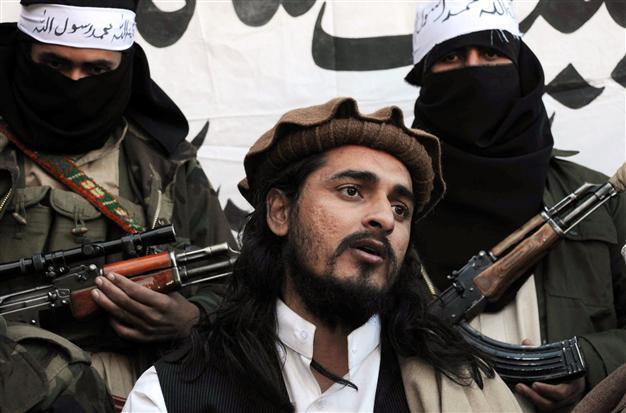Taliban name interim chief as Pakistan mulls US response
MIRANSHAH, Pakistan - Agence France-Presse

A US drone strike in northwest Pakistan on November 1, 2013, killed Pakistani Taliban leader Hakimullah Mehsud. AFP Photo
The Pakistani Taliban named an interim leader Sunday after the death of Hakimullah Mehsud in a drone strike, as the government mulled its next move after slamming the US for killing the militant chief.
Islamabad has said it will review "every aspect" of relations with Washington in the wake of the attack strike that killed Mehsud on Friday and which the interior minister described as the "murder of peace".
Representatives of the government had been due to meet the Tehreek-e-Taliban Pakistan (TTP) with a view to initiating peace talks when Mehsud was killed in the North Waziristan tribal area near the Afghan border.
Shahidullah Shahid, the main TTP spokesman, said a permanent replacement had not yet been chosen.
"Asmatullah Shaheen Bhittani, the head of the supreme shura, has been appointed as temporary head of the TTP," Shahid told AFP, adding that prayers for Mehsud were still going on.
Bhittani, the head of the central shura who was close to Mehsud, has been touted as a potential permanent replacement, as has the movement's number two Khan Said, alias Sajna.
Mehsud's death represents a significant blow for the TTP, which is blamed for killing thousands of soldiers, police and civilians in its six-year campaign against the Pakistani state.
But it prompted a furious response from the Pakistani government, with Interior Minister Chaudhry Nisar accusing Washington of "scuttling" the peace process -- though no talks had actually begun.
Prime Minister Nawaz Sharif is expected to chair a meeting of his top security advisers on Monday to discuss the next steps. Opposition parties led by Imran Khan's Pakistan Tehreek-e-Insaaf (PTI) party have demanded the government close Pakistan's roads to convoys supplying NATO forces in Afghanistan.
PTI has said it will block NATO convoys in the northwestern province of Khyber Pakhtunkhwa where it is in power, which would cut off one of the main crossing points into Afghanistan.
Pakistan blocked NATO convoys for seven months in 2012 after a botched US air raid killed 24 troops.
With NATO withdrawing 87,000 troops from Afghanistan by the end of next year after 12 years of war, the ground supply lines through Pakistan are of vital importance.
Sharif and his government must weigh their response to the Mehsud drone strike carefully, given that relations with Washington have been on the mend in recent months.
Last month US President Barack Obama welcomed Sharif to the White House and the State Department announced the release of $1.6 billion in aid, including $1.38 billion for the country's powerful military.
The money had been frozen as relations plummeted amid a series of crises in 2011 and 2012 including the US raid to kill Osama bin Laden at his hideout in Pakistan -- carried out without Pakistani knowledge.
Pakistan's press voiced surprise at Nisar's strongly-worded outburst, with several newspapers urging the government to seize the chance to strike the TTP while they are leaderless.
The pro-establishment daily Dawn doubted the claim that the drone strike necessarily meant the end of the peace process.
"If peace talks were not derailed by repeated militant attacks in recent months, why must an attack on the TTP leadership necessarily scuttle the possibility of talks?" it said in an editorial.
A State Department official said the issue of whether to negotiate with the TTP was an internal matter for Pakistan but Washington and Islamabad had "a vital, shared strategic interest in ending extremist violence".
Pakistan's foreign ministry summoned US ambassador Richard Olson on Saturday to protest over the drone strike that killed Mehsud, and another that struck a day earlier.
A ministry statement also stressed that despite the drone strike the government was "determined to continue with efforts to engage the TTP".
Islamabad routinely condemns drone strikes as a violation of sovereignty, and Sharif urged Obama to end them during their White House talks.
Mehsud's death is the third major blow against the TTP by the US this year, following the killing of number two Waliur Rehman in a drone strike in May and the capture of another senior lieutenant in Afghanistan revealed last month.
The TTP has risen to become arguably the biggest security threat facing Pakistan. It was behind the 2008 bombing of the Islamabad Marriott hotel and the attempt to kill schoolgirl activist Malala Yousafzai last year.
The TTP also claimed the 2010 Times Square bomb plot after training Pakistani-American Faisal Shahzad.
